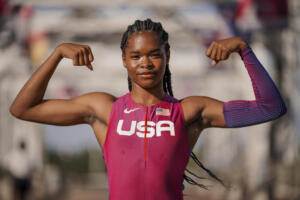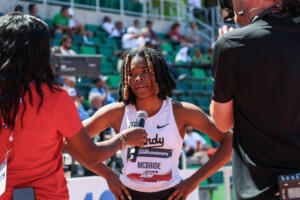A Stitch in Record Time
by Graham HaysOne hurdle and stitch at a time, All-American Allyria McBride is in a hurry to make a difference
There may come a day when Allyria McBride stands atop a podium, Olympic medal around her neck, listening to the final strains of the national anthem fade away. And in this moment of personal fulfillment, with the eyes of the world on her, it is entirely conceivable, perhaps even probable, that she will turn to officials and ask if they have any plans for the decorative bunting.
After all, someone could really turn all that fabric into something useful—maybe next year’s fashion hit or clothing for a worthy cause.
If anyone dares hint it will end up in the trash, she might well return the medal in disgust.
“Faster, higher, stronger,” the original Olympic motto, explains much about McBride. As a first-year student-athlete specializing in the 400-meter hurdles, she qualified for the NCAA Outdoor Track and Field Championships and earned All-America honors. Over the summer, she won a silver medal in the USA Track and Field Under-20 Championships and later a bronze against the hemisphere’s best in the Pan-American Under-20 Championships. As Vanderbilt begins its indoor track and field season by hosting this weekend’s Commodore Challenge, the sophomore from Marietta, Georgia, will look to take the next step toward SEC, NCAA and even world goals.
But three words aren’t nearly enough to wrap your mind around such an ebullient, inquisitive and ultimately hopeful person. You need at least three more to understand McBride, and why Nashville proved the ideal place for her to pursue her full potential. They’re another ubiquitous motto, and she learned them almost before she could run: reduce, reuse, recycle.
Attracted to Vanderbilt by the opportunity to learn from head coach and former hurdler Althea Thomas and by the university’s environmental sociology major, McBride is committed to protecting the world around her. Just ask teammates and coaches, whose smallest wasteful habits aren’t spared her reproachful looks and lectures. An avid sewist and crafter who teaches others those skills at the Wond’ry, Vanderbilt’s Innovation Center, she is transforming what began as a hobby into future innovation in sustainable fashion.
Whether one hurdle or one stitch at a time, she’s in a hurry to make her presence felt.
“I want to change the world—that’s why I’m very passionate about my major,” said McBride, the earnestness of the sentiment softened by the wide smile and tongue in cheek sentiment that followed. “You can honestly ask anybody—everybody’s very sick of me complaining about it and telling everybody to stop using dryer sheets. But that’s a hill I’m willing to die on.”

"She really thinks deeply about how a passion that many people have correlates to saving the earth and how she could be a catalyst in educating people."
Althea Thomas, Vanderbilt director of cross country and track and field
The same person is largely responsible for both passions, albeit with more expertise in one than the other. McBride’s mother, Leticia Beverly, was a six-time All-American in track and field at the University of Illinois. The founder and head coach of the East Cobb Cheetahs Track Club, she’s long been a fixture in the Georgia track and field scene. It was only a matter of time until McBride and her three brothers all found their way to the track. But one day, perhaps looking for ways to distract a daughter overspilling with energy, Beverly pulled out a do-it-yourself book and turned to instructions on making a shoebox doll bed. Beverly had learned enough basic stitches from her own mom to show McBride how to sew the pillow and add decorations. McBride, who has since inherited her grandmother’s prized sewing kit and makes clear she has become the teacher when she and Beverly talk sewing, took it from there.
“After that, it was me, a needle and YouTube,” McBride said. “And if I couldn’t figure it out, I would figure out how to figure it out.”
View this post on Instagram
It wasn’t just McBride’s penchant for cutting up old clothes to make something new for her dolls that occasionally exasperated her mother. From the moment she learned about the value of recycling while in the Girl Scouts, she guarded family trash bins, lest anything go to waste. In ninth grade, those green instincts found an outlet in an AP environmental science class that she begged her way into a year or two ahead of schedule. Suddenly, sewing and fashion weren’t just creative expressions but tools that she could hone to make a difference.
“There’s a joke in my house that nobody is allowed to throw away clothes,” McBride said. “They have to go to me first. They’ll bring me their trash bag and I’ll go through it, just diverting things from the landfill.”
When Thomas took over as Vanderbilt’s director of cross country and track and field after serving as associate head coach and recruiting coordinator at track and field powerhouse Georgia, she saw Vanderbilt’s challenging academics as an asset in building an elite program. A high school state champion in Georgia, McBride was a test case. She had connections to Vanderbilt (her aunt is Velma McBride Murry, University Distinguished Professor of Human and Organizational Development), and Beverly knows Thomas’ father from track clubs. But what ultimately won the day was the information Thomas sent the recruit about Vanderbilt’s environmental sociology major.
At Beverly’s insistence, McBride completed her other college visits. But she was determined to be a Commodore. And as ever, it wouldn’t take her long to get going.
In her first weeks on campus, McBride talked her way into a supposedly full freshman writing seminar on sustainable fashion. It met in the Wond’ry, which she had already set her sights on exploring after hearing about the center’s Fiber Arts Build Lab.
“It’s a sewer’s dream,” McBride said. “Anything you need to do a fiber craft is in there. We even have yarn and needles, so people can knit and crochet.”
Soon enough, she was working there, supervising the space, organizing supplies and mentoring as needed. In her own time, she’ll search area thrift stores for old clothes, blankets and materials or use donated cloth that would otherwise go to waste to make jackets, tote bags or pretty much anything else that she could then sell at craft fairs or use for charitable projects.
All with the goal of reducing waste without losing any of the style or joy of fashion.
“I’ve become the worst texter—I don’t know where my phone is,” McBride joked of her focus while working on creations in the Wond’ry. “Nothing else exists. It’s just me and this garment.
“It’s really a place where I unwind. I’m a fast person. I’ve got thoughts racing, I’ve got classwork. I’m juggling a lot—having a job, being an athlete, being on Vanderbilt’s campus. But being in the Wond’ry, being in front of a sewing machine, nothing else exists in that moment.”
As different as her worlds may seem on the surface—one creative and the other competitive—it’s the same focus that settles her active mind when she puts on her spikes and steps on the track. There, it’s just her and the hurdles stretching off into the distance.
For first-year student-athletes, college track and field is an adjustment regardless of your event—all the more when you compete in the SEC. But 400-meter hurdlers enter the deepest of deep ends. With the exception of only a few states, the standard high school distance hurdle race spans 300 meters, not the 400 meters familiar to college and international competition. It may not sound like much, but those extra 100 yards can be brutal.
“All the hurdles are 30 inches,” Thomas said, “But that last hurdle feels like it’s six feet tall.”
McBride had some experience at 400 meters from summer club competitions, but even so, she exceeded Thomas’ expectations in acclimating to her new surroundings. Even before the 400 hurdles, an outdoor race, she showed off elite speed in running the lead leg on the 4×400 relay team that finished third at the SEC Indoor Championships. And while still raw in many respects, still learning to alternate the leg that leads over the hurdle to maximize speed instead of chopping steps to always lead with the same leg, she thrived when outdoor season arrived.
“I think freshman year was so successful for me because I was just having fun,” McBride said. “I was like, ‘I don’t know anything, I’m here for the vibe.’ Coach AT has no expectations, she just wants me to use my other leg, so I’m going to go out there and use my other leg.’”

Last summer’s USATF U20 Outdoor Championships took place in Eugene, Oregon, in conjunction with the senior championships that determined American representation in the World Championships. Arriving at Hayward Field, hallowed ground in American track and field, days before she was scheduled to compete, McBride went into fangirl mode when she spotted Sydney McLaughlin, reigning Olympic champion and world record holder in the 400 hurdles. Amused, Thomas asked her who she thought was going to be at an event called the U.S. championship? But McBride remained starstruck at the thought of sharing a venue with McLaughlin, Noah Lyles, Dalilah Muhammad and many of the biggest names in the sport.
On some level, she knew she was talented. She kept winning races at every level she had tried, after all. But she never connected success in her small world with global aspirations. She barely knew there was a U20 Pan-Am event before traveling to Puerto Rico to compete in it.
And yet, after watching the preliminary heats for the senior 400 hurdles in Eugene, McBride leaned over to Thomas and noted that had she competed in that division, her time would have been fast enough to qualify for the semifinals, no small feat for someone her age.
“She’s very confident and very competitive,” Thomas said. “She knew that every time she stepped on the track, she wanted to win in that moment. But I would say she found comfort in keeping her lens narrow and just focusing on that. And so she never really saw how far down the road she can go. I say that in the past tense because, in our conversations after the junior Pan-Ams and winning her bronze medal, she told me she gets it now.”
View this post on Instagram
She would like to return to Eugene, not just to win big races at Hayward Field but perhaps one day work for Nike and lead the company’s sustainability efforts. And perhaps after that, she’ll revolutionize the fashion industry. When it comes to changing the world, she’s always dreamed big. It’s just that her track and field ambitions have finally caught up.
“She really thinks deeply about how a passion that many people have correlates to saving the earth and how she could be a catalyst in educating people,” Thomas said of fashion and sewing. “It’s very enlightening listening to her. It is very refreshing when you hear a student-athlete like that have an outlet that’s not running and physical.”
Solving the environmental crisis comes with daunting obstacles. But McBride doesn’t just embrace obstacles, she specializes in clearing them. That’s a good start.

